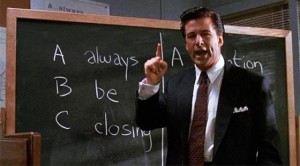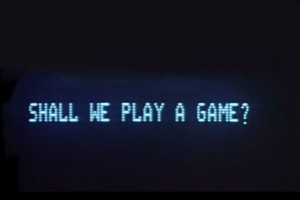Editor’s Note: A version of this post appeared in the San Antonio Express-News.
When I interviewed for my first bond sales job on Wall Street, half-way through the conversation the guy at JP Morgan sat back, held up a yellow #2 pencil, and said “Sell me this pencil.”
At that point, age 24 or so, I hadn’t yet read about this classic interview question. Nor, for that matter, was I a natural salesman.
I wish I had a recording or transcript of the interview, because I know I was terrible. He let me fumble around for about five minutes, completely flubbing the question. Afterwards, he told me what I should have said. [For the record, I got the job offer, but took the competing job at Goldman instead. In retrospect, though, my flubbing of the sales pitch should have been a clue. Anyway.]
The art of selling does not come naturally to me, but teaching does.
When given the opportunity to teach “the art of sales,” I’ve got plenty of confidence, not because I’m a great salesman but because I know how to teach concepts.
On the gap between my sales ability and my teaching ability, I’m reminded of the phrase “Those you can, do. And those who can’t, teach.”
Anyway, I mention this because a friend recently invited me to visit his startup business called Codeup, housed in San Antonio’s startup-incubator Geekdom, in order to teach his class sales concepts over an informal lunch.

Codeup is such a cool business that I should take a moment to explain my friend’s concept before returning to today’s main topic, “How to Sell.”
At Codeup, 30 adult students — post-High school, post-College, post-first career, whatever — pay tuition to enter a 12-week “Learn to Write Computer Code” bootcamp. The program promises the opportunity to go from beginner to well-compensated web programmer in just three months.
At the end of the 12 weeeks, Codeup students prepare a portfolio of programming work, including a start-up pitch, to present to prospective employers. I attended the first Codeup presentation at the Briscoe Museum downtown last spring, a science-fair type scene in which teams of newbie techies stand in front of their screens and explain their web solutions.
The art of selling matters to the students, who either need to find a job after Codeup or who need to win support for their startup. I noticed a few things about the sales pitches during that first portfolio presentation. I visited the second Codeup cohort to pass on some sales tips that could help them.
Here’s my No. 1 piece of advice on how to sell: Don’t sell me features. Ask me about my problems.
One of the most common mistakes in sales – especially by techies – is to describe the unique features of their product without figuring out first what the customer wants.
A bad pencil salesman: “See this pencil? Look, it’s a pretty mustard yellow. It has smooth graphite gliding action on the page and feels firm and wooden in your fingers. Would you like to buy it?”

“No. I need something in blue ink.”
“Ah, sorry.” Whah-wah-waaaaaa goes the sad trombone of bad sales.
A good pencil salesman asks me up front what problems I’m seeking to solve.
“Have you ever used a writing tool, and if so what’s worked and not worked for you in the past? What are you looking for when you write?”
When I walked into the presentation at the Briscoe, I occasionally got the hard sell on the features of the apps, rather than a question about what I’m trying to solve.
I recall one very cool app, but one of the guys needed help with his sales skills.
He was breathless with all the features. My (paraphrasing) recollection of his sales pitch:
“See this app on the big screen here? Our new app is programmed in JAVA Wargames XYZ machine language and displays food-safety data on restaurants in San Antonio, ranking them in reverse order by number of health citations, and coding them for food safety risk by red, yellow and green. This map uses OS Skynet 2.0 software to show all the restaurants in the city, and you can zoom in and out.

Then you click on the Hal9000 interface to see the actual citation on record with the city health department in a PDF format if you want. You search by food category of restaurant. Also, pretty soon we will try to link this to Yelp. Also, in the meantime, we hope to be able to get customer comments.”
Wrong approach. Too many features.
The better sales approach would start by asking me questions. Something like:
“When you eat out at restaurants, is food safety something you’ve ever considered when choosing a place to go? Have you ever tried to figure out for yourself the food safety of any restaurant? How have you tried to do that in the past?”
Now I feel like he could solve a problem of mine. Now I’m interested in the solution. Now the sales pitch works.
Incidentally, speaking of my friend’s Codeup business, how’s the job search going for you?
Have you ever wondered how to get into computer coding? Have you wondered how to get training for a good-paying job in just three months?
Post read (18899) times.





2 Replies to “On Selling – Sell Solutions Not Features”
In its simplest sense, sales-theory can probably most easily be learned by understanding the “submarine” diagram by the late David Sandler. Buying is a process with only a few steps that must cognitively occur in sequence. Moving from step to step has requirements (rules) and skipping any of said steps will most likely yield a sale for a competitor or a win for the status quo.
First place…Cadillac…second place…steak knives…third place?
I didn’t know about the Sandler submarine, but have now looked it up. Thanks!